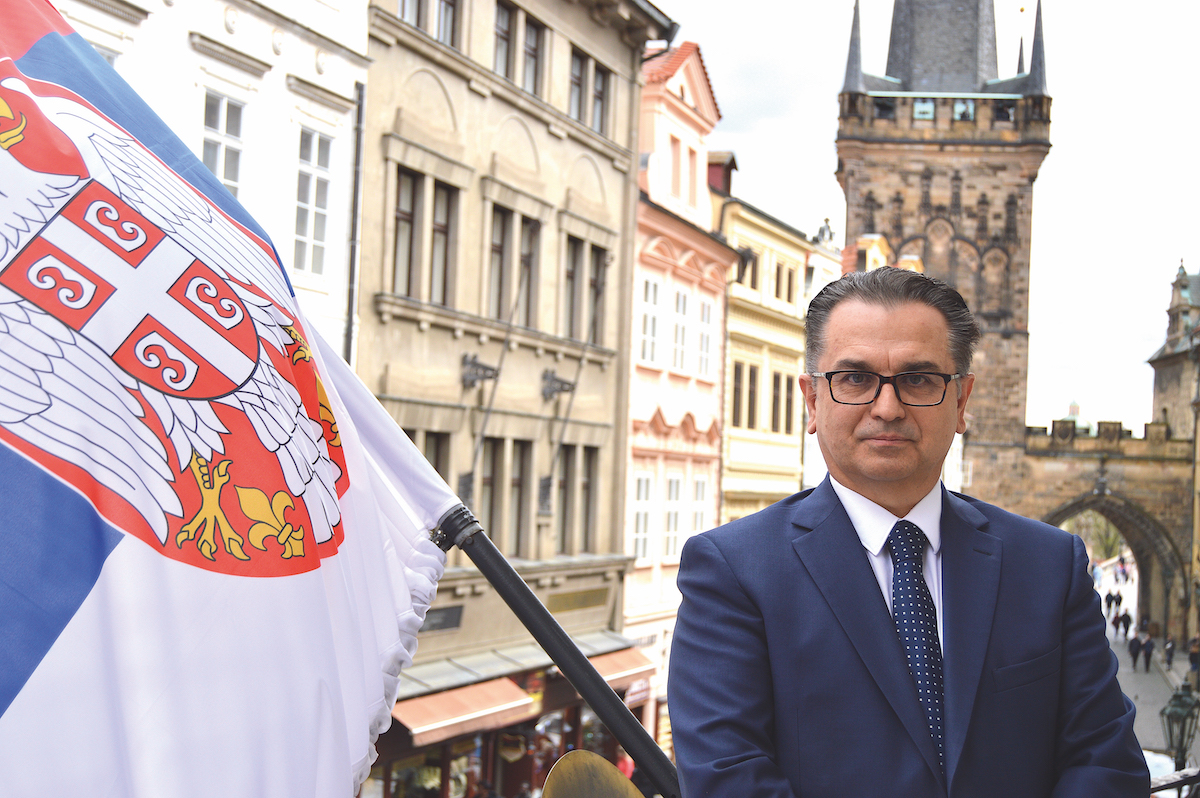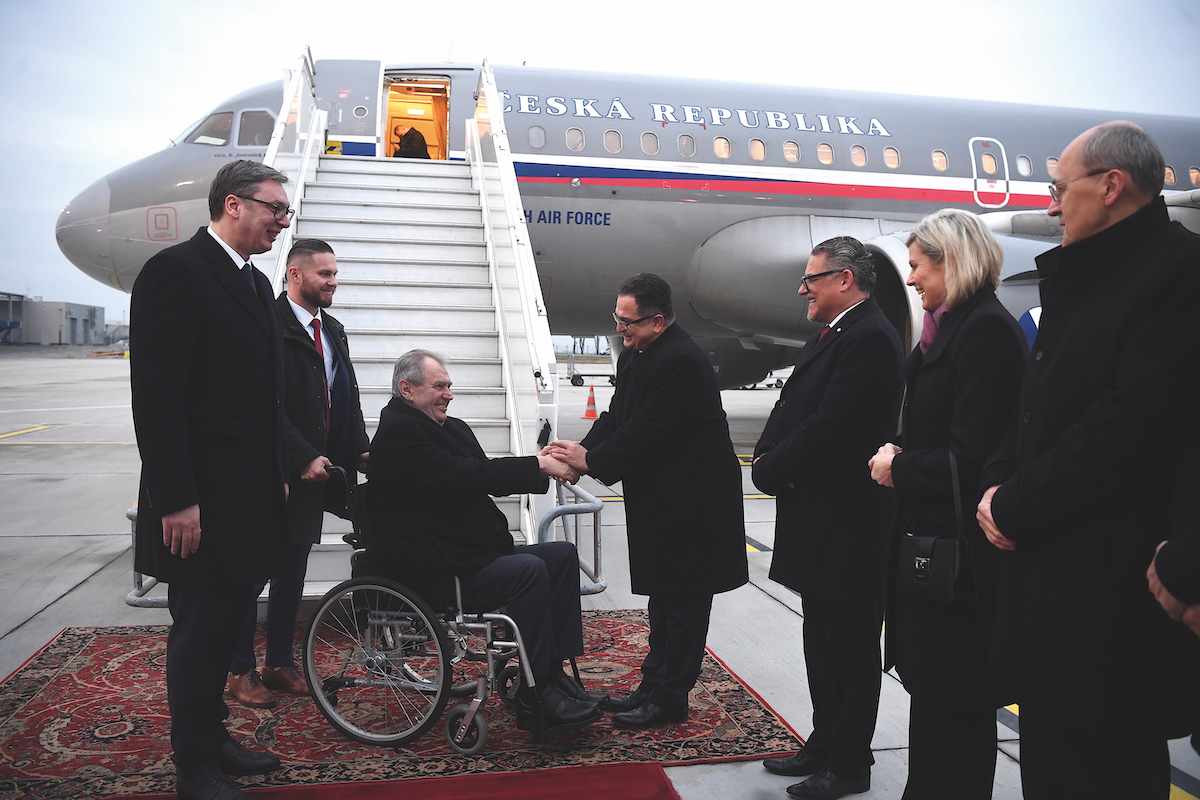“In surgery and diplomacy, mistakes can be costly”

H.E. Berislav Vekić, Ambassador of Serbia
Text: Martina Hošková and M.Zisso; Photo: Archive
“I believe that doctors are among the best ambassadors of their countries”, declares H.E. Mr. Berislav Vekić, Ambassador of Serbia and renowned surgeon. Why does he think so? What are the most pleasant and unpleasant events he had experienced during his assignment in the Czech Republic so far? And how does he view the two countries’ past and present relationships?
How does a renowned surgeon become an ambassador in the first place?
First, allow me to express my gratitude to you for the invitation to conduct this interview. It is a privilege to speak to a magazine with such a discerning readership. I am proud and privileged to be an ambassador to the Czech Republic. My path in diplomacy was specific, and many of my colleagues were surprised when they found out. I enjoy the opportunity to advance my surgical profession with my work in the public service. It all began at the Serbian Ministry of Health, where I worked for nine years as state secretary. During this period, I was working on reforms for the Serbian healthcare system, amendments to healthcare law, health insurance, public health, digitalization, and e-health, as well as management of the COVID-19 pandemic. Now, I am on a new assignment here in Prague.
You were successful in the field of medicine, including 10 books that you have published. What made you change the course of your professional career?
It might seem odd to see a successful doctor- surgeon leave the scalpel and dedicate himself to diplomacy. Surgery is a dynamic profession, which requires great medical knowledge and experience, as well as the courage to make the right surgical move at the right time. There, you cannot afford a mistake. Similarly, in diplomacy, it is important to make the right move, as mistakes can be costly. However,
I must admit that surgery is exhausting. After 35 years in the operating room, when you reach the pinnacle of your professional career and finish teaching young colleagues surgical work, I believe it is time to leave and give way to younger people.
As a temperamental person with an inquisitive spirit, I was looking for a new challenge. I believe that doctors are among the best ambassadors for their countries – with international contacts and connections, they are the best promoters of their countries. The experience of working in the Government of the Republic of Serbia as State Secretary in the Ministry of Health for nine years helped me to get involved in politics, prove myself, and gain new experience. I made my rich experience available to the state, and I am proud that my long- term engagement in politics has been recognized.
I owe a great deal of gratitude to the President of Serbia, Aleksandar Vučić, that today I am the ambassador to the Czech Republic.
You have been in the Czech Republic for about two years. How do you feel here?
I have been in the Czech Republic for a year and a half. I visited Prague previously for business, but also several times as a tourist. Every time, I would discover something new that is even more beautiful and attractive, and it is no coincidence that Prague is called the „Golden City“ on the Vltava. The city looks like a museum, with many monumental sights such as Prague Castle, Charles Bridge, and Old Town Square, and with charming Prague restaurants and pubs offering delicious traditional food, beer, and a Bohemian atmosphere. I managed to briefly visit other cities such as Brno or Pilsen, and I am amazed by the appearance and cultural heritage that these cities have. What positively surprised me was the fairly even regional development. I was also positively surprised by the level of industrial development in the Czech Republic, as well as the traffic system in Prague.
What is the most difficult part of being an ambassador, in your opinion?
Being an ambassador has its positive and negative effects on one’s lifestyle. When you come to live and work in a foreign country, you meet new people, learn about a new culture and customs, and enjoy new tasks and challenges. The job of a diplomat is to adapt quickly, identify mutual interests for cooperation, start building new bridges of friendship, open many doors, and find a way to improve the cooperation between the two countries. During my stay in the Czech Republic, I have encountered a friendly and open relationship so far. There is great interest in the Republic of Serbia, and readiness to improve bilateral relations in many fields such as politics, economy, culture, science, and sports.

From left: Mr. Aleksandar Vučić, President of Serbia; Mr. Miloš Zeman, President of Czechia; and H.E. Mr. Berislav Vekić, Ambassador of Serbia
Can you share the most pleasant and unpleasant moments of your stay here so far?
If I had to single out the most beautiful event in the past year and a half while I have been in Prague, it would certainly be my meeting with the President of the Czech Republic, Miloš Zeman. It was a wonderful feeling to talk with a true friend of Serbia, a political authority, and a great statesman. Every word he utters carries great weight. There are few such presidential authorities in the world as Miloš Zeman. In the last week of January, I will have the honour and pleasure of meeting him again, because he will be on an official visit to the Republic of Serbia. Presidential elections have just finished in the Czech Republic, and I wish the future president much success in his work, with the desire to continue the successful and friendly cooperation between our two countries.
On the other hand, the most unpleasant event occurred last year, when I found out that vandals damaged the World War I Serbian army mausoleum and cemetery. Allow me to remind you that Jindřichovice was the largest concentration camp ever established by the Austro-Hungarian authorities during World War I. It was in the western region of the Czech Republic, along the border with Germany, near Karlovy Vary. It is estimated that around 10,000 Serbs (civilians and soldiers) were killed in Jindřichovice over four years. Honestly, it was strange to me that such things were happening in a consolidated democracy like the Czech Republic.
What is the current status of Czech-Serbian relations?
Throughout history, Serbia and the Czech Republic have always had excellent relations. In the 14th century, historical records confirm that two great rulers, Serbian Emperor Dušan the Strong and Czech King Charles IV, had excellent relations.
The continuity of friendly relations between the two nations is confirmed by the friendship between King Aleksandar Karađorđević and Tomáš Garrigue Masaryk. The first Czechoslovak president, T. G. Masaryk, was persecuted by the Austro- Hungarian army during World War I, therefore he travelled with Serbian passports that are still kept in the Czech Academy of Sciences. Today, the Republic of Serbia and the Czech Republic have no open questions. Bilateral cooperation has been established, which is confirmed by frequent visits at the highest political level. Trade in 2021 was at a record high and increased by 21%. All data indicates that 2022 will be even better, despite the severe economic and energy crisis, as well as the war events in Ukraine. Czech investments in the Republic of Serbia grow every year.
What recommendations can you give to Czech tourists travelling to Serbia?
Serbia is a beautiful country, with many authentic and beautiful landscapes. When you spend your vacation in Serbia, we recommend that you see the Kopaonik National Park (with the Jelovarnik waterfall), the Uvac nature reserve, Vlasin Lake, Semeteško Lake (with floating islands that represent a real attraction), Krupajsko Vrelo, Đavolja Varoš, Rajačke Pimnice, the Ancient Palace of Felix Romuliana, Serbian monasteries such as Studenica, Sopoćani, Žiča, and so on.
In recent years, Serbia has been developing rural tourism, which is very popular and enjoyed by an increasing number of tourists. Belgrade has become a famous European destination, attractive to all tourists around the world. Besides the old city, the Kalemegdan fortress, a new modern part of the city („Belgrade Waterfront“) has emerged. Tourists adore Belgrade, not only because of its rich historical program and large number of cultural events, but also for its rich nightlife. This includes restaurants by the Sava and Danube rivers, with traditional Serbian cuisine and wines that are becoming increasingly popular in the market. I try to promote Serbia as an attractive tourist destination at every opportunity. In addition, the embassy has contacts with the tourist organization of Serbia, hence we communicate with our colleagues from the Czech Republic regarding new trends and opportunities for cooperation in the field of tourism.
What do you do in your free time?
Frankly, I don’t have much free time. If I had to give a short answer, it would be that I take walks in nature, read, and write. I use my free time to spend more time with my family, and enjoy nature in famous Prague parks. I like to read quality literature, good books and novels, and also follow the latest professional medical journals. Finally, I also like to write, and classify my scientific achievements in the field of surgery. I am currently working on a surgical textbook for medical students.
Does your country want to join the EU and NATO?
Serbia has a clear European path, and wants to share European values. The Republic of Serbia is very keen to achieve this goal, and is fully aware of the importance of the tasks and challenges that lie ahead. Negotiations on the Stabilization and Association Agreement (SAA) between the European Union and Serbia began in November 2005, and this agreement, as well as the follow-up to the Transitional Agreement on Trade and Trade Matters (2005) treaty, were both signed in 2008.
After changing the methodology, we opened only the 4th cluster in December 2021, although we had also prepared the 3rd cluster. I would rather not comment on all the reasons for this long and difficult European journey of Serbia.
When we talk about NATO, the situation is different. Serbia wants to remain a neutral country. I think it is not yet the right time to discuss membership in NATO, even though all the surrounding countries of the Western Balkans have become members. The memories and suffering of the Serbian people since the NATO bombing in 1999 are still fresh.
Life in shelters, while planes are flying above you and rockets are falling, life under sanctions – it is something that cannot be easily forgotten.
In February, Serbia celebrates its National Day. What do you wish for your country?
The Statehood Day of the Republic of Serbia, on February 15th, is also the Day of the Constitution of Serbia, as well as the day of commemoration of the beginning of the Serbian Revolution – the first Serbian uprising. What I wish for my people, my Serbia, I also wish for the Czech people – which is peace and prosperity. We are living in difficult, uncertain times with the war in Ukraine. We are facing devastation and tragedy, where the innocent civilian population of two nations are suffering.
I hope that reason will prevail, and there will be peace and prosperity again. War has never brought anyone anything good. We will pray for peace.

